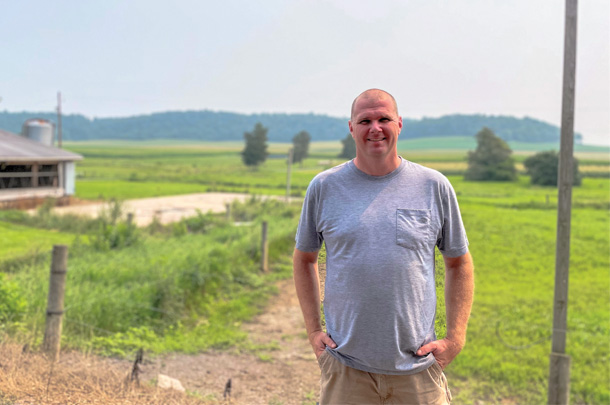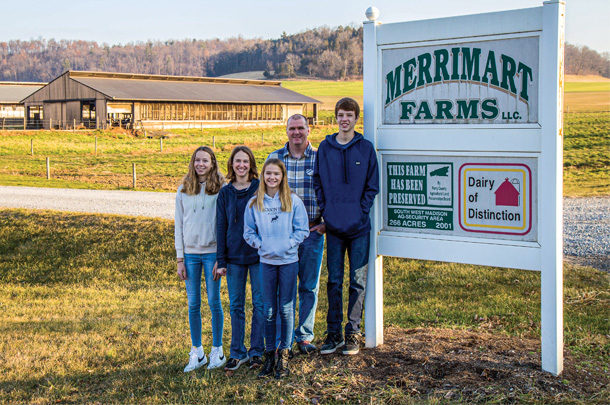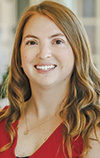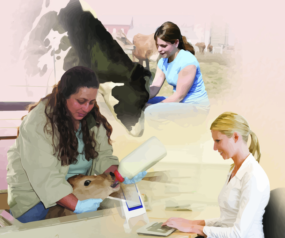Donny and Shari Bartch own and operate Merrimart Farms, milking approximately 260 cows and farming 1,000 acres in Perry County, Pennsylvania. Shari, the fourth generation of the Martin family farming in the area, and Donny have been partners in the family farm for 18 years, becoming sole owners in 2018. They received the 2022 Pennsylvania Distinguished Dairy Producer Award during the Pennsylvania Dairy Summit in February.
Donny was interviewed in a recent Pennsylvania Center for Dairy Excellence (CDE) “Cow-Side Conversations” podcast. Looking back at his previous career working in an office in Harrisburg, he recalls the couple’s decision to join Shari’s family farm partnership.

“I remember distinctly sitting there in my cubicle, looking out the window, and saying ‘What am I doing inside here?’ It was an eye-opener that it wasn’t what I wanted to do for the rest of my career, just sitting inside and pushing a pencil,” Bartch explained. “It made the decision very easy when I had the opportunity and knew what kind of work I was getting into. Shari and I also realized what kind of opportunity it was to be able to raise our family here on the farm.”
During their involvement on the farm, Donny and Shari have focused on high-quality feeds and intensive double cropping. This has allowed the farm to invest in additional feed storage and housing for additional animals. Adding diversification, they also feed 150 Holstein steers and do custom farm work for neighboring farms each year.
With three full-time employees and 10 part-time employees, Merrimart Farms’ management structure and philosophy are focused on efficiency.
“Our philosophy is efficiency: just keeping everything running smoothly and keeping everyone busy. We don’t wait around for the next job or the next problem to solve,” Bartch said. “I just want to make the best use of the time I have with the employees here each day and even my own time.”
Transition process involved moderator
Building the partnership and transitioning the dairy farm between family members was a bit more complicated. The process was also lengthy, taking seven years to complete. Through a “Transition Team” grant they received from the Pennsylvania CDE, the family was able to pay a consultant to help initiate difficult conversations.
“As we started the transition process, none of us knew what we wanted, how it was going to happen or how to move all these assets from one generation to the next,” he explained. “Having a third-party moderator involved – someone who was unbiased and impartial to the situation – really helped us ask those important questions. It got people to think and answer the tough questions on what they wanted to see out of this transition.
“The third party can take away some of the tension that some dairy farm families might have. You’re not sitting across from each other bickering. You have someone actually controlling the conversation and moving the conversation in a direction,” Bartch said. “It may not be the direction that one side wants, but it’s still a direction. I think it keeps family members from blaming each other back and forth.”
Communication critical
With 10 part-time employees, open communication has not only benefited family members but Merrimart Farms’ younger-generation staff as well. Bartch described how his team motivates the high school employees with regular reminders about the operation’s goals.
“When working with high schoolers and college students, we
try to create a team feeling so they know they’re part of something bigger than just milking cows. We’re working toward a goal here,” he explained. “I always like sharing numbers with the milkers to show them how they’re doing, whether it’s somatic cell count, milk production or clinical mastitis cases.”
Turning to technology
After growing their business in size and scale, as well as quality and efficiency, Donny and Shari continue to seek out ways to improve their herd and overall business. A contributing factor is their passion for innovation and automated technology.
As Donny and Shari considered the future of their dairy operation and the best ways to manage and empower their younger employees, they kept returning to the idea of robotic technology. After building a new calf facility and integrating a robotic calf feeder, they noticed a difference in the number of employees needed to get the job done.
“The robotics didn’t save us a whole lot of time in actual employee labor, but it did eliminate an extra person who needed to be there at times. Now one person could spend that same 45 minutes each feeding doing those tasks instead of having two people go out to the barn. The robotics have helped us incorporate fewer people and get the same amount of work done,” he said.
With a grant from the Pennsylvania CDE, Bartch worked with outside consultants to perform a feasibility study and determine if robotic milking technology was plausible from a financial standpoint. After crunching the numbers, the family expects to break ground this spring on a robotic milking barn, with the goal of it becoming a high-production, early lactation facility. Bartch hopes this type of technology will also offer new opportunities to the next generation.
“Technology seems to be part of young people’s lives 100 percent of the time. [Robotics] are a good fit and gives my kids and these high schoolers an opportunity to grab a hold of something that they’re comfortable with and recognize,” Bartch explained. “It also gives us a new spark. If the next generation wants to milk cows, I hope it gives them something to make their own.”
Additional strategies
Bartch shared additional strategies he uses to communicate with multiple generations, manage a family business and motivate a younger workforce:
-
Be patient. “As the younger generation, you sometimes have to be prepared to take it slow or figure out different ways to introduce your ideas to the older generation,” Bartch said. “It probably won’t happen overnight with the first conversation. My in-laws were also very patient with us. They wanted to see this transition happen. It goes back to the moderators we had – they encouraged us to ask the right questions and answer honestly with each other.”
-
Be open. “You never know where this next generation is coming from. Don’t think it has to be just your kids. It may be a son-in-law or daughter-in-law. It may be an employee who comes on who has a passion for it. Be open to that, especially if you want your dairy operation to continue for another generation,” Bartch said.
-
Be honest with yourself. “Know what you want but know how to communicate that. I heard a quote the other day, ‘I may be right, but the way I said it made me wrong.’ It hit home with the way you can react in a tense situation that has a lot of emotions attached to it. Take a step back, think about what you’re trying to say, and be prepared to have your toes stepped on a little bit,” he said.
-
Reflect on your strengths. “One thing I learned very quickly when I went from being an employee to the one making decisions was that I can’t do everything, and I don’t know how to do everything,” Bartch said. “I needed to find other people who knew a lot more than myself to do certain jobs. It was a learning curve trying to figure out my strengths and what I really enjoyed doing.”
-
Remember your purpose. “It’s not so much about ownership. It’s about continuing the legacy the past generations have started and the amount of work you know they put in. It’s about how you are benefiting from that and what you can do to make it benefit the next generation. Both generations should remember: At the end of the day, you have to step back and think about what this is all for,” Bartch concluded.

PHOTO 1: Donny and Shari Bartch of Merrimart Farms LLC in Perry County received the Pennsylvania Distinguished Dairy Producer Award during the Pennsylvania Dairy Summit in February.
PHOTO 2: Featured in a recent Pennsylvania Center for Dairy Excellence “Cow-Side Conversations” podcast, Donny Bartch reflected on the complex transition process that comes along with a family business and multiple generations and shares how the decision to invest in robotics is helping to transform the future of their operation. Courtesy photo.
Emily Barge is the communications and marketing manager with Pennsylvania’s Center for Dairy Excellence.
-
Jayne Sebright
- Executive Director
- Center for Dairy Excellence
- Email Jayne Sebright










